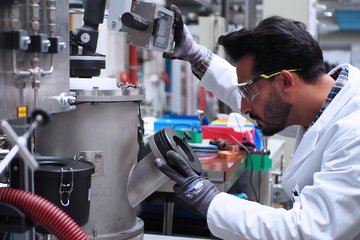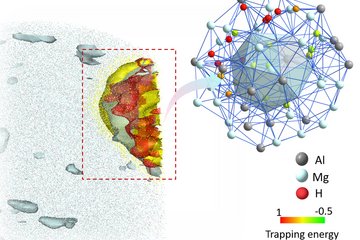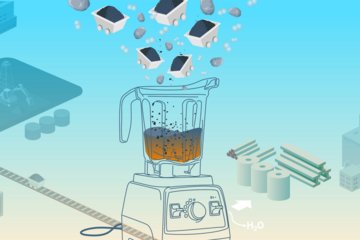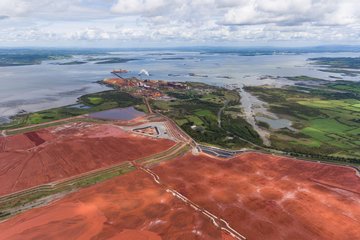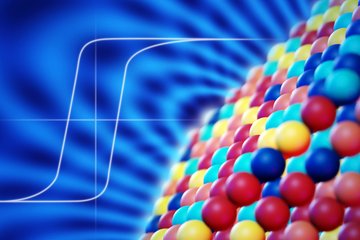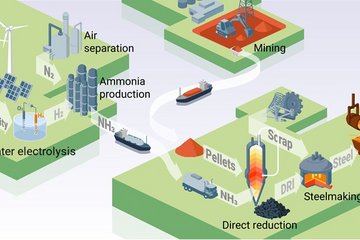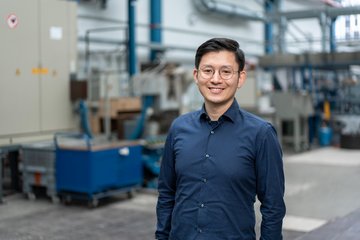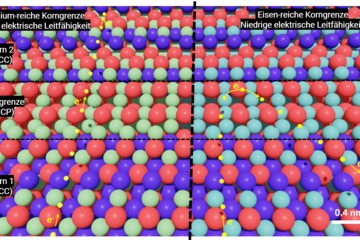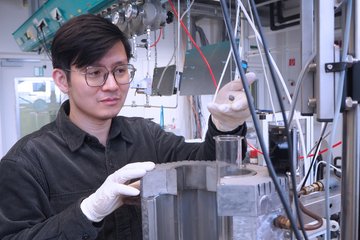Alle Typen
581.
Vortrag
Atoms, ions, electrons: simulated, measured and manipulated. Workshop on Scientific Directions for Future Transmission Electron Microscopy, Jülich, Germany (2016)
582.
Vortrag
Chemo-Mechanics at Lattice Defects: from Mechanisms to Bulk Alloys. Gordon Research Conference on Thin Film & Small Scale Mechanical Behavior, Lewiston, ME, USA (2016)
583.
Vortrag
Martensitic transformation in metamagnetic NiMnAl-based alloys: Insights for magnetocaloric properties. 2nd German-Dutch Workshop on Computational Materials Science, Domburg, The Netherlands (2016)
584.
Vortrag
Development of methodologies to efficiently compute melting properties fully from ab initio. 2nd German-Dutch Workshop on Computational Materials Science, Domburg, The Netherlands (2016)
585.
Vortrag
HPC-Based Quantum Mechanical Design of Engineering Materials. Exascale Computing Workshop during ICS 2016, Frankfurt, Germany (2016)
586.
Vortrag
Hydrogen embrittlement research at the MPIE (Max-Planck-Institut für Eisenforschung). SNEAC Workshop Environmental Assisted Cracking, Trondheim, Norway (2016)
587.
Vortrag
Defect Segregation studied by Correlative Atom Probe Tomography and Electron Microscopy. Japan-Germany Joint Symposium on Advanced Characterization of Nanostructured Materials for Energy and Environment, Conference Center Mutterhaus, Düsseldorf, Germany (2016)
588.
Vortrag
Phase diagrams in magnetic shape memory alloys: Insights obtained from ab initio thermodynamics. The forty-fifth International Conference on Computer Coupling of Phase Diagrams and Thermochemistry, Awaji Island, Hyogo, Japan (2016)
589.
Vortrag
Ab initio determination of lattice stabilities and comparison to CALPHAD. Plenary talk, CALPHAD XLV Conference, Awaji Island, Japan (2016)
590.
Vortrag
An ab-initio prediction of the off-stoichiometry of Fe–Mn–Al–C κ carbides. CALPHAD XLV, Awaji Island, Hyogo, Japan (2016)
591.
Vortrag
Database concepts and ICME links for atomistic simulations. Plenary talk, 2nd International Workshop on Software Solutions for Integrated Computational Materials Engineering ICME 2016, Barcelona, Spain (2016)
592.
Vortrag
Automated calculations for charged point defects in MgO and α-Fe2O3. DPG-Frühjahrstagung 2016, Regensburg, Germany (2016)
593.
Vortrag
Intricacies of phonon line shapes in random alloys: A first-principles study. DPG Spring Meeting of the Condensed Matter Section, Regensburg, Germany (2016)
594.
Vortrag
Origin of the off-stoichiometry of Fe–Mn–Al–C κ carbides: An ab-initio explanation of atom probe tomography data. DPG 2016, Regensburg, Germany (2016)
595.
Vortrag
Impact of point defects on the phase stability in Heusler alloys: A first-principles study. DPG Spring Meeting of the Condensed Matter Section, Regensburg, Germany (2016)
596.
Vortrag
Ab initio Determination of Formation Energies and Charge Transfer Levels of Charged Ions in Water. APS 2016, Baltimore, MD, USA (2016)
597.
Vortrag
Formation Energy of Ions in Water using ab-initio Molecular Dynamics. DPG Frühjahrstagung 2016, Regensburg, Germany (2016)
598.
Vortrag
Heat capacity of the quaternary Q phase in Al–Cu–Mg–Si: A combined ab-initio, phonon and compound energy formalism approach. DPG-Frühjahrstagung 2016, Regensburg, Germany (2016)
599.
Vortrag
The digital transformation in Materials Science from a Modellers Perspective. VDI Workshop „Digitale Transformation in der Werkstofftechnik”, Düsseldorf, Germany (2016)
600.
Vortrag
Lattice excitations in magnetic alloys: Recent advances in ab initio modeling of coupled spin and atomic fluctuations. TMS Annual Meeting 2016, Nashville, TN, USA (2016)
